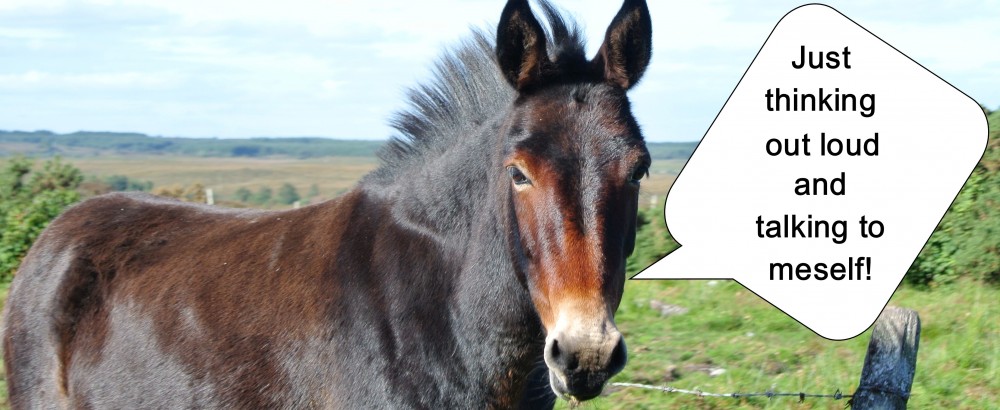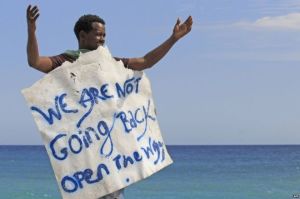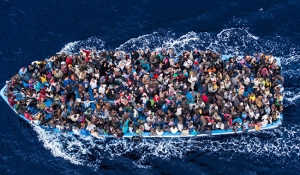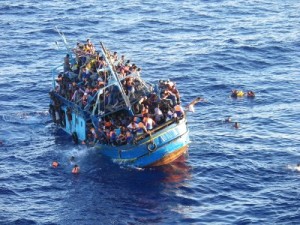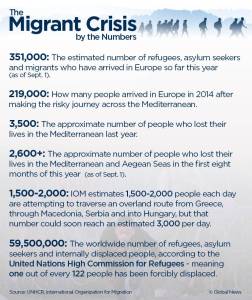Little did I think that a blog post I wrote just over two months ago, Moving to Ireland, would become a hot topic. It was a small idea, a blog post written more out of wishful thinking and curiosity than a BIG idea with political and social mindfulness at its core.
Moving to Ireland has become more than just the notion of packing your bags and knowing that you need almost $24,000 as annual disposable income. Now that people are jumping on top of the channel tunnel trains, drowning off-shore of Turkey, Greece and Italy, “moving” from one European Union country to another has escalated far beyond $24,000 per annum disposable income.
Let’s face it, this type of migration is not voluntary, it is life or death, as witnessed in the hundreds of people drowned, suffocated in trucks, or killed by trains. This is not just a house move, or a relocation; this is a Mass Exodus of people who are willing to risk their lives for a better life away from their homeland. This mass exodus brings out the best and the worst in host countries.
But what’s the point of moving to a country where unemployment is high, the cost of living is even higher, and the natives don’t want you in the first place? Maybe the point is that what these migrants are leaving behind is so much worse. Is opening up the borders the answer?
According to Hamish de Bretton Gordon, Managing Director CBRN of Avon Protection Systems, We’re Missing The Point. “The solution,” de Bretton Gordon says, ” is not opening up Europe’s borders; it’s defeating ISIL and removing Assad from power.”
“The refugee problem in Europe is of our own making,” he says. ” It is a direct result of our inactivity towards Syria,… ignoring the perceived and stated red lines on the use of chemical weapons after the Ghouta chemical attack in August 2013.” The attack killed up to 1,500 people when, “government forces fired rockets with chemical warheads into Damascus suburbs.” Hind sight is 20/20.
The issue of thousands of people showing up at your doorstep, many without passports or identification, is not going away, even if Assad “goes away.” Refugees come from war-torn countries, escaping persecution. They are legally entitled to international protection. For some migrants proving refugee status will be difficult without the proper ID. Who gets to stay and who gets sent back becomes a murky issue. It becomes one involving the distinction between refugee, irregular migrant, and economic migrant. It is then further complicated by the Contonou Agreement and the UNHCR’s Non-Refoulement.
As stated in the 1951 UN Convention on the Status of Refugees, “No Contracting State shall expel or return (“refouler”) a refugee in any manner whatsoever to the frontiers of territories where his life or freedom would be threatened on account of his race, religion, nationality, membership of a particular social group or political opinion.”
Most recently the European Agenda on Migration addressed the current immigrant crisis.
On paper, the European Agenda on Migration May 13, 2015 sounds beautiful, humanitarian and idealistic:
“Europe should continue to be a safe haven for those fleeing persecution as well as an attractive destination for the talent and entrepreneurship of students, researchers and workers. Upholding our international commitments and values while securing our borders and at the same time creating the right conditions for Europe’s economic prosperity and societal cohesion is a difficult balancing act that requires coordinated action at the European level.”
A difficult balancing act indeed. Ireland, the UK and Denmark can choose whether they wish to be part of the EU Quota Scheme to adequately and fairly relocate refugees and migrants among member states. Why choice is an option for these three countries, I don’t know. But Ireland and England are accepting large numbers of refugees into their general populations. But is it enough?
According to the BBC, “the Irish government announced it would take in 4,000 refugees – a figure that includes 1,120 people Ireland had already agreed to receive.” The UK will accept 20,000 Syrian refugees by 2020. And as of today, Denmark’s reaction to Germany’s no-limit refugee quota was to shut down rail service, ferry service and a motorway for several hours whilst a standoff between police and 350 refugees, mostly from Syria and Iraq, played itself out.
According to MSN News, “German generosity has sparked an angry backlash,” but not just from its eastern neighbors. For it is the “difficult balancing act” of “economic prosperity and societal cohesion” that brings out the worst in the natives of host countries in Europe. In 2008 most European countries entered into deep economic recessions, and now, barely emerging from that fog, their populations expand, and with it the economic demand to care for new refugees. In other words, where will the money come from to house, feed, clothe and educate the growing numbers of refugees. Realistically, making their homeland safe again for their return is the best answer. But can it be done?
I suppose my questions, like Hamish de Bretton Gordon’s, are these: Why didn’t governments intervene earlier? Apart from being bamboozled by Syria’s first lady who threw corporate lingo around at leisure, apart from watching the Arab Spring as if it were all happening so far away it would never effect us negatively; why didn’t the Ghouta chemical attack in August 2013 cause more of a Global reaction?
Hind sight is 20/20. Ten years from now what will be the situation in Syria, Iraq and Europe? Is opening the borders the answer, or is defeat of dictatorships the answer? I suppose it depends on who takes the dictator’s place.
Many years ago I sat in a classroom along with many other journalism students. We were led in discussion by our professor who prompted a debate on the shooting of a 9 year old Mexican boy crossing the border into the USA.
I remembered a 2002 documentary by Michael Palin, Sahara. He discussed the treacherous swim that North Africans made to get to southern European shores. Clothes discarded and hidden along the beach, these migrants were swimming to freedom. Some didn’t make it; their bodies washing up on the shore. Just like the 9 year old boy who was trying to make a run for it, to a better life across the border.
I was shocked at how many young people in the classroom were against illegal immigration. I remember saying that borders were imaginary lines on paper maps. They mean nothing to people hungry for a better way of life. People have migrated for eons, and will continue to do so. But the recent migration crisis in Europe is so huge, so immense, there is no acclimatization period. It is immediate.
What struck me most about the classroom that day, was that we were all immigrants. Maybe off the boat, or second or third generation immigrants. But we were all from somewhere else.
Example 1 of the Worst of Human Behavior in Migrant Crisis in Europe
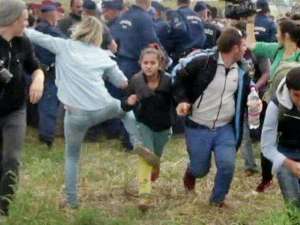
Hungarian TV camerawoman Petra Laszlo kicks a running child as refugees flee border police near the Serbian border with Hungary (Picture via MSNBC.com)
Example Number 1 of the BEST of Human Behavior
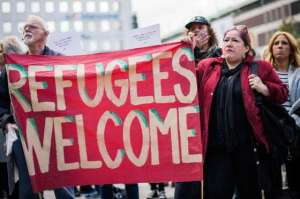
People hold a banner ‘refugees welcome’ as they take part in a demonstration in solidarity with refugees seeking asylum in Europe after fleeing their home countries in Stockholm, Sweden, on September 12, 2015.
(Picture Via: MSN News.com)
